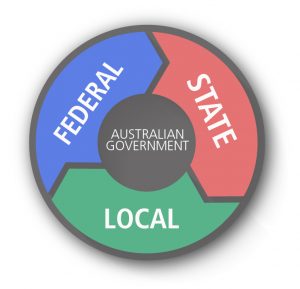Online Training
Levels of Government
There are three levels of government.
- The Federal Government
- State or Territory Governments
- Local Government
Each level of Government is responsible for specific items as set out in the Constitution.

The Federal Government
The Federal Government is responsible for the conduct of national affairs.
This includes items such as:
- Defence
- Foreign Affairs
- Trade
- Commerce
- Currency
- Immigration
- Postal services
- Telecommunications and broadcasting
- Air travel
- Most social services and pensions
They also provide funding for many activities that are carried out by the States and Territories such as health, education, environmental issues and industrial relations.
For more information on the National Constitution click here.
State or Territory Governments
State government responsibilities include:
- Schools
- Hospitals
- Roads, railways and public transport
- Police, emergency services and prisons
- Public works
- Agriculture and fishing
- Industrial relations
- Community services
- Sport and recreation
- Consumer affairs
- Conservation and environment
Each State or Territory has its own constitution which provides a framework of law. It sets out the powers and rules under which the houses of parliament, government agencies and local government can operate.
The NSW Constitution introduced an Act of Parliament in 1902. It has been amended many times since. It can be changed by an ordinary amendment Act in Parliament, although some sections can only be amended through a referendum of NSW voters.
Local Government
Your local government might be called a City Council, Shire Council or Municipal Council.
- City Councils look after an urban or suburban local government area e.g. Wollongong City Council.
- Shire Councils look after a rural local government area, generally covering larger rural land areas but with less residents than a City Council e.g. Eurobodalla Shire Council.
- Municipal Councils are not in every state but in New South Wales it is used to describe older urban areas e.g. Kiama Municipal Council.
The powers of local government are controlled by Acts of State Parliament e.g. Local Government Acts.
Local Government Councils are concerned with matters close to our homes such as:
- Building regulations and developments
- Public health
- Local roads and footpaths/bike paths
- Parks and sporting grounds
- Libraries
- Waste disposal
- Local environmental issues
- Some community services.
Here’s a short video to watch on the differences between Local, State and Federal governments.

